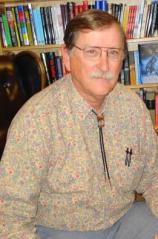Author Talk: March 19, 2020
Steven F. Havill is the author of a series of mysteries set in fictional Posadas County, New Mexico, the 24th installment of which, LESS THAN A MOMENT, is now in stores. In this interview, Havill explains why he decided --- over the course of the series --- to replace his almost-70-year-old protagonist, Sheriff Bill Gastner, with a younger generation of law enforcement officers, Bob Torrez and Estelle Reyes-Guzman; how New Mexico is drastically different now than it was when he moved there in 1965; his opinions on the evolution of the publishing industry from the early ’90s (when he began writing the Posadas County mysteries) to today; and why he got such a kick out of one reader who commented on enjoying his books.
Question: LESS THAN A MOMENT is the 24th book in your critically acclaimed Posadas County Mystery series. When HEARTSHOT, your first book, was published in 1991, did you ever foresee reaching a 24th book in the series? There aren’t many mystery authors who began in the ’90s who can make the same claim.
Steven F. Havill: I cheerfully admit that I didn't write HEARTSHOT thinking that it might turn into a series. Certainly not 24 titles! And I have to say that the original New York publisher never discussed a possible series with me. It was just a natural for a sequel. HEARTSHOT ends with Bill Gastner hospitalized for a heart attack, so it made sense that the next story, also starring him, would begin with him convalescing. It was really with the second title, BITTER RECOIL, that I started thinking that this story might make a good series, and Bill seemed like a likable and versatile protagonist.
Q: It seems the characters you created have aged in real time, or something close to it. When did you realize that protagonist Sheriff Bill Gastner --- who was already 60 when the series began --- was going to have to step aside for the next generation in the form of your current Hispanic protagonists, Bob Torrez and Estelle Reyes-Guzman?
SFH: HEARTSHOT opens with Bill fussing with modern gadgets. The second book has him well outside his comfort zone, dealing with nasty crimes up in the Jemez. The third title, TWICE BURIED, features the return of Estelle and her husband and infant son to Posadas County to begin their saga. By the ninth title, BAG LIMIT, Bill is frustrated with law enforcement, is frustrated with his role as county sheriff, and is ready to have someone else take over. Estelle has moved up in the department and becomes undersheriff. Thus starts the team of Sheriff Bob Torrez and Estelle, which continues through LESS THAN A MOMENT.
Q: As a former teacher in and around such small New Mexico towns as Datil, Milan and Old Lincoln, you have observed a world as exotic to many American readers as Ketchikan, Alaska. Did you ever anticipate that this border area would become the backdrop to front-page headlines a quarter century later?
SFH: No. New Mexico is not the same state it was in 1965 when I moved here. The pressure of surging and service-demanding population, the crush of traffic, drugs and crime --- all have left their mark. Law enforcement has become more complicated as urban issues move into rural areas. Bill Gastner, trained in the ’50s and ’60s, is clearly uncomfortable in the modern digital age. I have to admit, in many ways, so am I. I can't imagine trying to teach a classroom of students, all armed with cell phones and iPods. And I am irritated every time I see one of those huge "New Mexico True" billboards blocking the view!
Q: You recently earned your degree in gunsmithing. Could you explain what getting an AAS degree in that discipline entails exactly?
SFH: The two-year program is a lot of fun and a lot of hard work, with classes dedicated to learning machining, design and repair --- a nice mix of metal and wood work. It's also a program that constantly struggles with existence in a politically correct world. Started in 1947, how long the program stays viable remains to be seen.
Q: As a veteran of the publishing scene since the early ’90s, you have witnessed a number of trends and upheavals. Are there changes to the industry you regret with the perspective of 29 years as a published author? And might there be one or two that you feel are an improvement over the business models of 1991?
SFH: What a loaded question! In 1941, my father received a six-page, single-spaced typed letter from his editor in New York. I've read that letter many times, and the advice in it is as true today as it was then. In 1995, I received a five-page letter from my New York editor, and the advice and discussion is wonderful --- and still true. Now, a writer is lucky to receive a cryptic email or tweet. We are soon going to regret turning our society over to computers and the internet. Sure, being able to ship a heavy manuscript effortlessly as an email attachment is wonderful...until some younger generation editor expects these old eyes to edit a screen version of the galley proof!
Q: How will the Posadas County series end?
SFH: With a whimper, I suppose. Just like the possible sequels to HEARTSHOT way back when, I haven't planned the future yet. I'm in the middle of the newest yarn, with a working title of CASUAL ENEMIES. Will Bill survive it? Will Bobby and Estelle retire? Will Francisco finally hit a sour note? Who knows?
Q: Do you enjoy hearing from readers?
SFH: Absolutely. It's a real kick to talk to readers who have embraced the series, following the cast's adventures. One reader wrote that "reading the book was like sitting down for coffee with my grandfather and listening to his stories." Long, productive health to your grandfather, I say.




